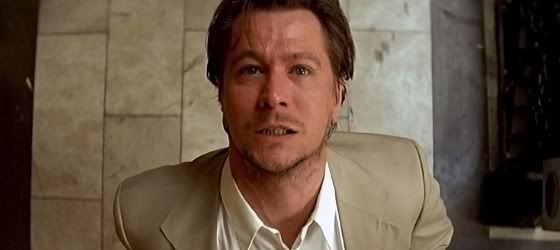So what makes a great bad guy? For me a truly great bad guy draws focus and drives a movie. They should be the epicentre of pretty much every scene they're in and the audience should look forward to seeing their dastardly deeds develop. They should be more than just a hurdle for the protagonist to deal with and should linger in the dark recesses of your mind long after the credits roll. I also wanted to avoid the predictable slasher horror bad guys (i.e. Freddy Krueger, Jasons Voorhees and Michael Myers) because they tend to be quite boring and lack substance and charisma. I have also avoided reprobate central characters (i.e. Patrick Bateman in 'American Psycho') because you see the world through their eyes and this compromises things - they are no longer an antagonist for a protagonist, they tend to become a lot more. So without further ado here are ten such bad guys (in no particular order) which came to mind whilst I was pondering this topic.
'The Hitcher' is a decent movie but not the best mentioned in this list; none of that matters though because it does exactly what it sets out to do and that is leave an impact. This fright fest follows a young man travelling on the road who, against all better judgement, decides to pick up a hitcher in the pouring rain. This is the single worst decision he will ever make. "The Hitcher" has no motive and this is the most worrying thing - he can't be bargained with or persuaded to stop and he wont stop until one of you is dead. When asked what he wants he replies "for you to stop me". After seeing this bad guy in action I promise you'll never pick up a hitchhiker again.
4. The Joker (The Dark Knight)
The Joker would be on pretty much everyone's bad guy list and for very good reason. Heath Ledger gave his finest performance breathing new life into the character of the Joker and unfortunately passed away not long afterwards. I could probably count the amount of good comic book movies on one hand; 'The Dark Knight' is the best by an absolute mile and The Joker is a fitting bad guy. He is a character without rules, the perfect antithesis to the very moral and self righteous attitudes of Batman. In a way, the fact that you're looking at one of the last performances of an actor only adds to the power and atmosphere of his scenes - although Ledger's Joker is flawlessly enigmatic and charismatic to begin with.
5. Hans Landa (Inglourious Basterds)
'Inglourious Basterds' was a wonderful film and a return to form for Tarantino after the, in my opinion, tiresomely glib and clumsy Kill Bill movies. Christoph Waltz made this movie for me, exhibiting Tarantino's trademark bubblegum dialogue at its best since the scene which inspired my blog title. He was a revelation and definitely deserved the Oscar for best supporting actor. His character, Hans Landa, is both hilarious and terrifying depending on when you look at him. One minute he is the bumbling, grinning, overly polite Hans ("it's a bingo!") and the next he is "The Jew Hunter", ordering Jew executions and strangling women with his bare hands. He flits effortlessly between the two and it's wonderful and terrifying to watch in equal measure.
6. Keyser Soze (The Usual Suspects)
For the benefit of all who haven't seen 'The Usual Suspects' I wont say too much about Soze (for reasons which will be obvious to all who have seen it). All I will say is that his shadow hangs over everything and you get the feeling that he is always ominously watching over the central characters. A wonderful character movie, with a fantastic and iconic ending.
7. Darth Vader (Star Wars)
Ok ok I admit Darth has become a bit of a cliché and the prequel trilogy didn't exactly do his persona any good ("nooooooooo") but he is and always will be one of the archetypal bad guys. From that very first scene when he stepped into that starship corridor littered with rebel bodies, he had the audience gripped. There will always be something scary about the combination of his expressionless black mask and creepily audible breathing and because of that I decided he had to be on the list.
8. Anton Sigur
Another very deserving Oscar winner here. Sigur is one of the most frightening characters I have ever come across in a book and Javier Bardem did a spectacular job bringing that character to the screen in the faithful adaptation by the brilliant Coen Brothers. With Sigur, actions certainly speak louder than words and his actions are generally extremely violent (hence the tension which fills every scene in which he features). The scene below is definitely up there with my favorites; you can't help but feel bad for this poor old shop assistant! Watch as Sigur psychologically tears him to pieces for no reason.
9. Amon Goth (Schindler's List)
Yet another Nazi, but lets face it Nazis are pretty good bad guys. Ralph Fiennes plays Amon Goth, based on a real life Austrian Nazi who became a concentration camp commandant. I think this character was immortalized by his slick coldness, his use of the phrase "I pardon you" and the following balcony scene where he acts out his very obvious God complex. He executes Jews as if they were literally just rats and is pretty much the personification of Hitler's hatred and disgust.
10. Norman Stansfield (Leon)






























